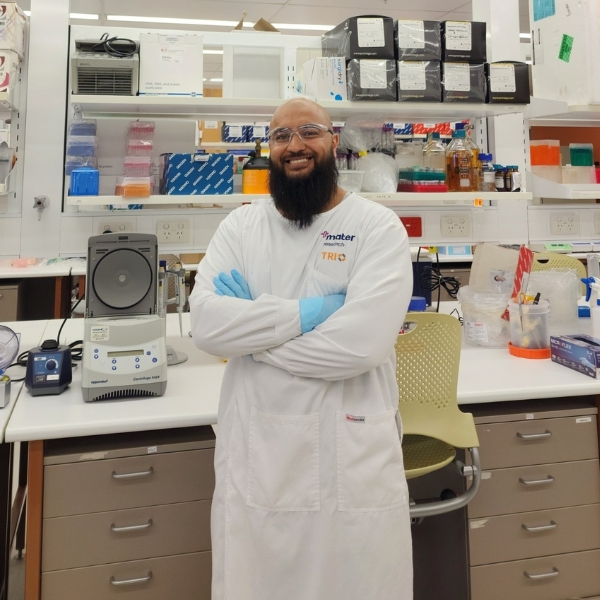2024 Gunn Family Haematology Fellowship Awardee

In April, and with continued generous funding from the Gunn Family Foundation, Snowdome Foundation invited applications for a haematological amyloidosis research project that could accelerate clinical trials for patients with amyloidosis and related disorders.
We warmly congratulate Muhammed B. Sabdia, a final year PhD student at the Mater Research Institute, The University of Queensland who was awarded the fellowship.
Muhammed will focus on a proposed personalised immunotherapeutic approach, that harnesses a patient’s own T-cell immunity to eradicate the patient’s unique disease. He will be submitting his PhD thesis later this year before embarking on this world-first project.
AL amyloidosis is a rare incurable disorder, that affects around 320 Australians each year1. AL amyloidosis is caused by dysfunctional clonal plasma cells within the bone marrow that secrete Immunoglobulin light chains that misfold to form amyloid fibrils. These fibrils deposit in major organs, leading to organ failure and death.
“I was motivated to focus on AL amyloidosis because of the poor outcomes of these patients. As a rare disorder there is limited research and development into this disorder. We need new therapies, specifically designed for AL amyloidosis to accelerate clinical outcomes for these patients. Utilising methodologies optimised during my PhD degree, I am seeking to develop a new immune based approach, targeted against a patient’s unique dysfunctional plasma cells,” said Muhammed.
To stimulate T-cell neoantigen immunity in patients with AL amyloidosis, Muhammed, in collaboration with the BASE mRNA facility at The University of Queensland, will design and develop personalized mRNA vaccines. These mRNA vaccines will direct a patient’s T-cells to target unique proteins on the patient’s unique plasma cells called neoantigens.
This would enable the T-cells to specifically eradicate the plasma cells that cause disease, promoting long-lived immunosurveillance and remission. It was previously thought plasma cells contain few neoantigens, however, Muhammed’s current research has shown that the Immunoglobulin genes contain numerous targetable neoantigens.
“Receiving this prestigious fellowship so early on in my career, will enable me to develop the necessary expertise to accelerate the understanding and treatment of rare blood disorders. The methodology I am proposing will be transferable to blood cancers which will foster further collaborations with other researchers and clinicians, both locally and internationally. I am incredibly grateful to the Gunn Family and Snowdome Foundations for providing this incredible opportunity, which I hope will lead to improved outcomes for patients with blood disorders and cancers,” said Muhammed.
It is believed that this is a world-first approach, that perfectly aligns with our mission of accelerating next-generation treatments, getting them to Australian blood cancer patients faster.
The Gunn Family Haematology Fellowship is a multi-year project over three years. Muhammed’s ultimate goal is to translate his research to clinical trials. This would not have been possible without the generous support of the Gunn Family Foundation.
“I hope no one has to hear their blood cancer is incurable. I’d like every person to have the opportunity to live a long, fulfilling and happy life with their family and friends. My family’s Foundation is delighted to support Muhammed in his research, particularly given my own amyloidosis diagnosis,” said Jackie Haintz.
We look forward to bringing you updates as Muhammed’s research progresses.
1) Wisniowski, B. et. al. The epidemiology of amyloidosis in Australia. Amyloid. 2019
